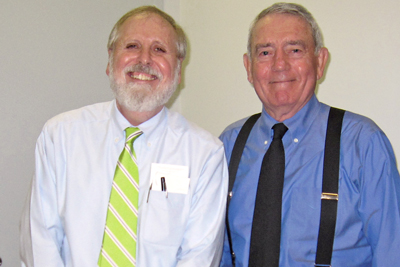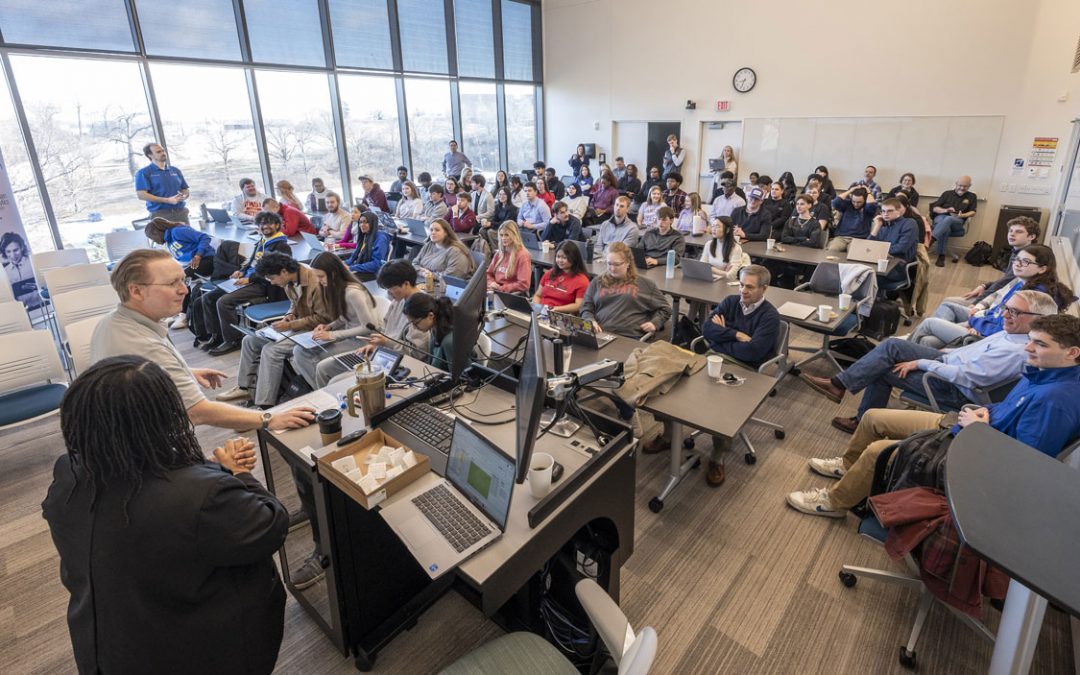
UMSL's Michael D. Murray (left) poses with veteran broadcast journalist Dan Rather. Over the summer Murray interviewed Rather about the newsman's new memoir, “Rather Outspoken: My Life in the News.”
For more than four decades Dan Rather was a fixture at CBS. For 24 of those years he helmed the “CBS Evening News” anchor desk before retiring in 2005. But that didn’t spell the end of his broadcasting career. Seven years later, he’s still as busy as ever. He’s the managing editor and anchor of the news magazine program “Dan Rather Reports,” which airs on the cable channel AXS TV.
This summer, Michael D. Murray, Curators’ Teaching Professor of Media Studies at the University of Missouri–St. Louis, sat down with Rather to talk about the newsman’s new memoir, “Rather Outspoken: My Life in the News.”
UMSL Daily caught up with Murray recently to talk about his one-on-one chat with Rather and how Rather’s new book reveals more about the man behind the anchorman.
You interviewed Dan Rather recently. What was the purpose of the interview?
I was asked by one of the leading academic journals, American Journalism, to write a composite review comparing two books that were published at about the same time this summer. “Rather Outspoken” was published in May and is chock full of insights about all the important moments of Rather’s career and some personal observations. The other book I reviewed was “Cronkite” by well-known American historian Douglas Brinkley, which is about the life of the “CBS News” icon Walter Cronkite. Interestingly, Rather took over the anchor desk at “CBS Evening News” from Cronkite.
Did you have any other special goals in mind?
Dan Rather is the most accomplished active broadcast news reporter in our country still working today. If you consider all of the biggest national stories of the past 50 years: civil rights, JFK assassination, Vietnam, Watergate, the Gulf Wars and 9/11, he was on the ground and usually reporting “live” from the scene of all those stories, usually smack-dab in the middle of them. So, I wanted to get some of his experiences on the record in a candid interview format and then try to get the interview published, if possible, which I’m still hoping to do.
Is there anything different about doing this kind of research?
I’ve done a lot of research on news leaders at the national level. I’ve interviewed Walter Cronkite, David Brinkley and Tom Brokaw, and really just about anyone of importance in the field. I discovered years ago that very few broadcast documents are retained, in spite of their potential importance. I find people tend to not fully appreciate the contributions TV news makes to our culture and national development. They tend to see it mostly as an extension of the entertainment business. I think that’s a mistake. So, I made a conscious effort years ago to try to talk to as many of the news leaders as I could, and to try to get them on the record on what they feel is important about what they’ve done, and the important stories they may have covered.
What were some of your conclusions from this particular interview?
Dan Rather is a fascinating person and really as accomplished a person as there is in broadcast news. He is modest with a funny sense of humor. He is very quick, but also thoughtful. His time as a CBS anchor and the managing editor actually exceeded Walter Cronkite’s. And I also discovered that Rather has a better appreciation for what he’s done than almost any contemporaries. He also does a good job of retaining material from what he’s done and is doing. And besides, I had never interviewed him. This gave me an excuse to do it.
Had you ever met him before?
Yes, we met before, but just in passing. I worked for CBS and wrote a lot about it over the years. I edited the “Encyclopedia of TV News” and also a book about the controversial “CBS News” documentaries called “The Political Performers.” In the course of conducting the research, I would bump into him and we’d talk a little.
What did you do at CBS? What kind of job did you have?
I worked for the “CBS News” division and the News Election Service while I was still an undergraduate student. Some professors helped me land those jobs, and they were paying jobs, not internships. But times were a little different then. I once oversaw technical operations for the Midwest during the 1968 elections. That sounds very impressive, but I was just making sure that the old teletype machines used back then were up and functioning properly. I saw to it that the election returns were shared quickly, so they could be reported all over. It wasn’t very complicated. It was really kind of boring. And ironically, I missed a lot of national news that was happening while I was gathering the news locally. But I appreciated the support and getting that experience.
Why were you motivated to want to talk to Dan Rather in person? Where did you interview him?
We spoke for about an hour and a half in his office on 42nd Street in Manhattan, N.Y., where he does his program, “Dan Rather Reports,” for AXS TV. I wanted to talk to him because I thought this book contained some interesting material. He’s written a lot of books. But this one is very different.
How so? What’s different?
His other books focus on a particular period of time or a key assignment he held, like chief White House correspondent. He wrote about the Nixon White House and Watergate in “The Palace Guard,” but for this one, he revisited the key stories he’s worked on and addressed all of the presidents he’s covered. He also discusses the story involving President George W. Bush that landed him in hot water and also his lawsuit against CBS. He’s at peace with that now and this new book is also dedicated to his wife Jean. He talks about her influence and her support and counsel and a little about his family life, so there’s a lot more personal material.
Did he say anything that really surprised you?
The section of the book about civil rights was interesting, so we talked a lot about that. He was covering that story while he was still in his 30s with a young wife and family. The civil rights story was a scary assignment, and he does not feel that it is being covered properly in schools today.














